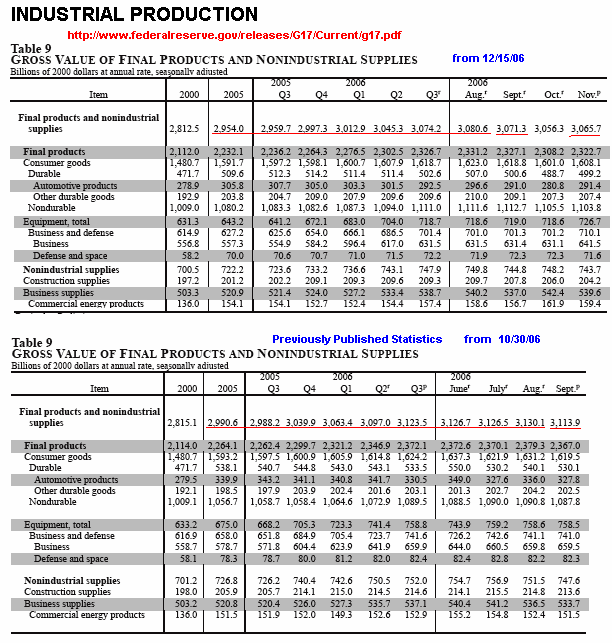Quote:
|
Originally Posted by unlawflcombatnt
Friday's Industrial Production "increase" of 0.2% is another example of the Federal Reserve manipulating statistics to make currently published figures appear "good" or "improved." From the Fed's own publication of Industrial Production figures taken from 10/30/06, the "Gross Value of Final Products and Nonindustrial Supplies" has been downwardly revised for every single time period shown. Every quarterly report has been revised downward. August and September's numbers have been downwardly revised. Even the total for 2005 has been downwardly revised by $36 billion, from the previously reported $2.990 trillion down to $2.954 trillion. (This would subtract approximately 0.1% from 2005's reported GDP.)
Even using only the current numbers, there has been a $15 billion net decline in Industrial Production since August. However, using the previously published number for August of $3.1301 trillion, there has been a decline of $64.4 billion to November's $3.0657 trillion. This is a decline in the annual rate of over 2% in 3 months.
(Below is a modified copy of both the Federal Reserves report from 12/15/06 on Industrial Production on the top with a copy of the Fed's report from 10-30-06 on the bottom. The changed numbers are underlined in red.)

(Friday's Fed Release can be found at Industrial Production)
Are these signs of an economy that is "strong, and getting stronger"? At best, much of this so-called "growth" has been a result of statistical manipulation, especially through the downward revision of previously published numbers.
unlawflcombatnt
Economic Populist Forum
EconomicPopulistCommentary
_________________
The economy needs balance between the "means of production" & "means of consumption." |
The Fed has been attempting to slow the economy since 2004 because they have publiclly stated that the economy is growing too fast generating inflationary concerns.
I don't think it is uncommon for national economic reports to be revised. To know if they have recently started manipulating data, we would have to know the history of how frequently and how often this paticular report has been revised.
It is interesting how things have changed. 15 years ago you could hardly find anyone who even knew that the Federal Reserve Board existed and even fewer who knew what their current stance on the economy was. Greenspan in paticular became a "rock star", I think it went to his head.
Our entire economic system is predicated on growth and every participant from top to bottom manipulates data because of pressures to show growth, if the data is consistently manipulated over time, you can still use the data as long as you factor in what you consider the manipulation factor. For example the speedometer in my car is about 5% off, if it says I am going 65 in reality I am going closer to 62. If there is a significant shift, then we have a problem until we get a handle on it and understand the shift.
We currently have so many people looking at economic measures in so many different ways that if one measure is inconsistant with others it is called into question or simply discounted.
Personally I think our economy is strong and diverse. Industrial production is cyclical within its overall long term trend. However, there is service, technology, communication, agriculture, energy, financial, military, medical, entertainment and other sectors in our economy that can lead growth when industrial production slows. Often a major problem is when people don't anticipate changes in macro economic trends and get trapped in a failing economic sector.